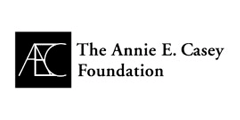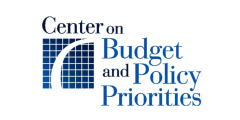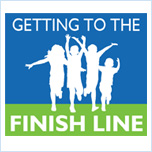Voices for Utah Children works with many good organizations that provide research and reports on all aspects of children's issues.
Partners
The Annie E. Casey Foundation
 The Annie E. Casey Foundation provides funding and technical assistance for a nationwide network of KIDS COUNT grantee projects that collect data on and advocate for the well-being of children at the state and local levels.
The Annie E. Casey Foundation provides funding and technical assistance for a nationwide network of KIDS COUNT grantee projects that collect data on and advocate for the well-being of children at the state and local levels.
Visit the Annie E. Case Foundation website.
The Georgetown Center for Children and Families
 The Center for Children and Families (CCF) is an independent, nonpartisan policy and research center whose mission is to expand and improve health coverage for America's children and families.
The Center for Children and Families (CCF) is an independent, nonpartisan policy and research center whose mission is to expand and improve health coverage for America's children and families.
Center on Budget and Policy Priorities
 The Center on Budget and Policy Priorities is one of the nation's premier policy organizations working at the federal and state levels on fiscal policy and public programs that affect low- and moderate-income families and individuals.
The Center on Budget and Policy Priorities is one of the nation's premier policy organizations working at the federal and state levels on fiscal policy and public programs that affect low- and moderate-income families and individuals.
Visit the Center on Budget and Policy Priorities website.
First Focus
 First Focus is a bipartisan advocacy organization that is committed to making children and families a priority in federal policy and budget decisions.
First Focus is a bipartisan advocacy organization that is committed to making children and families a priority in federal policy and budget decisions.
Visit the First Focus website.
Spitfire Strategies
 Spitfire Strategies is a national consulting firm offering nonprofits and foundations top-notch strategic communications and campaign planning, training, counsel and tools.
Spitfire Strategies is a national consulting firm offering nonprofits and foundations top-notch strategic communications and campaign planning, training, counsel and tools.
Visit the Spitfire Strategies website.
Projects
State Priorities Partnership
The State Priorities Partnership (SPP) 
Finish Line
 In 2007, the David and Lucile Packard Foundation Board of Trustees approved a significant new, multi-year grant making strategy in its work toward the goal of ensuring that all of America's children have health insurance. The Finish Line project supports state-based groups working to expand children's health insurance coverage through investments in advocacy, policy analysis, communications, technical assistance, cross-program learning, and training.
In 2007, the David and Lucile Packard Foundation Board of Trustees approved a significant new, multi-year grant making strategy in its work toward the goal of ensuring that all of America's children have health insurance. The Finish Line project supports state-based groups working to expand children's health insurance coverage through investments in advocacy, policy analysis, communications, technical assistance, cross-program learning, and training.
Kids Count
 KIDS COUNT is a national and state-by-state effort to track the status of children in the United States funded by the Annie E. Casey Foundation. and Voices for Utah Children that provides statistical data on the education, health and economic well-being of children and their families. Utilizing KIDS COUNT data allows policymakers and community leaders to make data-driven decisions that will provide a better future for our state's youngest citizens.
KIDS COUNT is a national and state-by-state effort to track the status of children in the United States funded by the Annie E. Casey Foundation. and Voices for Utah Children that provides statistical data on the education, health and economic well-being of children and their families. Utilizing KIDS COUNT data allows policymakers and community leaders to make data-driven decisions that will provide a better future for our state's youngest citizens.
Measures of Child Well-Being
For 15 years it has been the priority of the Utah KIDS COUNT Project to ensure that policymakers, advocates, community service providers, the media, and concerned citizens have quality data on how children are doing in our state. These yearly publications provide county level data on a variety of child well-being indicators.
Visit the Utah KIDS COUNT Data Center.
Ascend at the Aspen Institute
 Ascend is a policy program of the Aspen Institute (ascend.aspeninstitute.org) and the national hub for breakthrough ideas and collaborations that move vulnerable children and their parents toward educational success and economic security. We take a two-generation approach to our work focusing on both children and their parents together and bring a gender and racial equity lens to our analysis.
Ascend is a policy program of the Aspen Institute (ascend.aspeninstitute.org) and the national hub for breakthrough ideas and collaborations that move vulnerable children and their parents toward educational success and economic security. We take a two-generation approach to our work focusing on both children and their parents together and bring a gender and racial equity lens to our analysis.
The two-generation strategy: Low-income families in Utah are facing increasingly hard times. The overall poverty rate is 13.2 percent. The poverty rate for children has grown steadily, from 11 percent in 2007 to 16 percent in 2011. The research is clear that poverty is the single greatest threat to children’s well-being. Children raised in poverty are much more likely to be poor as adults. While even a few years in poverty can have a significant impact on children’s future well-being, the risks are particularly severe for those who experience multiple years and will often pass on to their own children poverty conditions with all the attending consequences. We believe that the most effective way to put children on a path to productive, successful adulthood is through two-generation strategies – strategies that both help parents move their families ahead economically and improve young children’s health, development and educational success. Two-generation strategies are vital to reducing socioeconomic and racial/ethnic disparities that affect children’s life chances.





